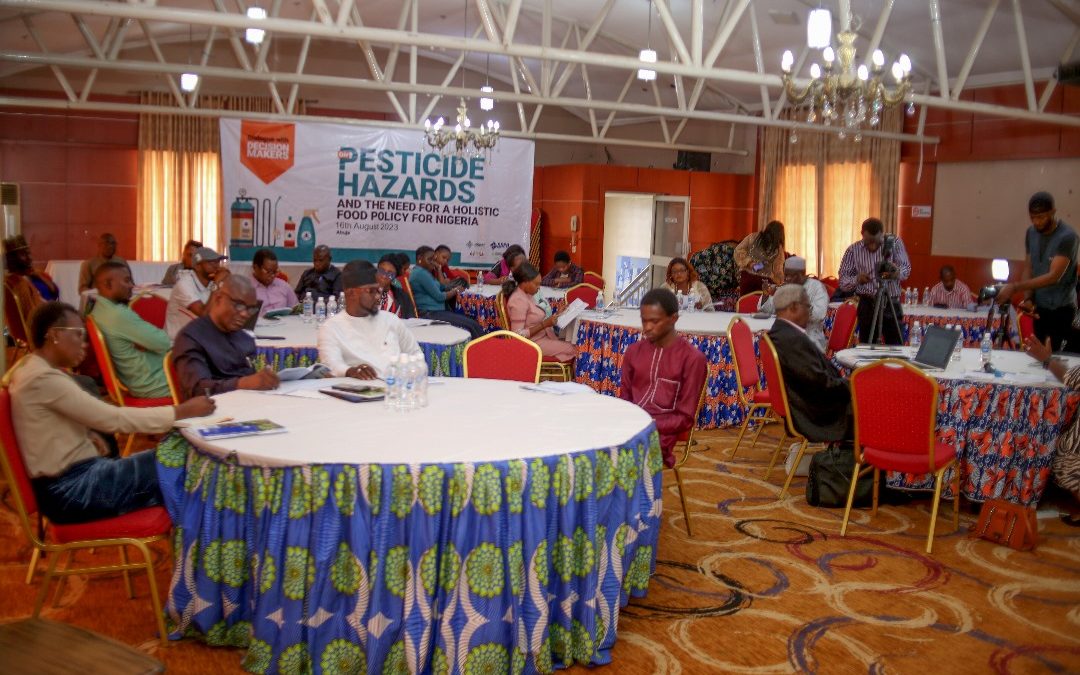The indiscriminate import and use of internationally banned and Highly Hazardous Pesticides (HHPs) has severe consequences for human health, the environment and the economics of households, communities and the nation at large. The impacts of pesticides on human health and the environment are well documented, but not necessarily known to the wider public. Traces of pesticides from agriculture can be detected everywhere – in beer and honey, on fruit and vegetables, in the grass on playgrounds, and even in urine and in the air. We know they cause severe harm to insects and plants and contaminate water bodies for years. In Nigeria, like other countries of the world, legislators and policymakers should bear a significant responsibility in improving pesticide legislation, regulation and use, reducing the hazards of toxic and banned pesticides, addressing the double standards in international pesticide exports to developing countries by more developed countries in Europe, USA and Asia, and supporting legislations that ensure a safer, healthier and sustainable food system..
Genetically modified organisms (GMOs) have generated significant debate and concern worldwide, including in Nigeria. It is important to note that the potential dangers and disadvantages associated with GMOs can vary depending on the specific crop, the type of modification, and how it is managed. GMO crops have unintended environmental consequences, such as the potential for crossbreeding with wild relatives, leading to the spread of modified genes into natural ecosystems and loss of indigenous varieties. Some GMO crops are engineered to be resistant to certain pesticides, which can lead to the development of pesticide-resistant pests. The long-term health effects of consuming GMOs are not yet fully understood, and many argue for precautionary measures to be central in the consideration of approvals and adoption. GMOs are a major threat to local indigenous plants and species. The ownership and control of the GMO technology by multinational agro-corporations raise concerns about intellectual property rights and access to seeds. The precautionary principle in the approval of GMO commercialization in Nigeria has largely been ignored by the responsible Agency, as their function seems to have been reduced from regulators to marketers and promoters of GMOs and biotechnology.
The global agricultural industry is a multi-trillion-dollar industry. Only a few influential agrochemical companies divide the global pesticide market among themselves. Among them are German companies like Bayer and BASF, and Syngenta and Corteva. These companies are all European companies controlling over 70% of the global pesticide market. They also dominate (56%) the global seed market (including GMOs). These companies combine seed sales and pesticide production; ensuring that chemical pesticides are used to cultivate their seeds.
A coordinated local national-centered approach involving multiple stakeholders, including government bodies, civil society organizations, and the international community, is essential to safeguarding the nation’s agricultural sector, environment, and public health from the perils of hazardous pesticides and arresting the hasty push of GMOs in Nigeria. Through proactive legislative and policy measures, Nigeria can pave the way for a safer and more sustainable agricultural future. On 16 August 2023, the Health of Mother Earth Foundation (HOMEF) in collaboration with the Alliance for Action on Pesticides in Nigeria (AAPN) and the Alliance for Food Sovereignty in Africa organized a dialogue with decision-makers on pesticide hazards and the Need for a Holistic Food Policy for Nigeria.
The event;
- Established relationships and understanding with legislatures in the 10th National Assembly on the issues and consequences of the continued dependence on chemical pesticides and GMOs in our food system;
- Identified the roles and necessary actions required of the legislatures to improve the regulation of pesticides and GMOs in our food sector.
- Recommended to the legislature clear legislative actions needed to improve pesticide regulation and use in Nigeria.
Download and read the communique here:





